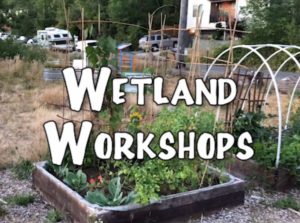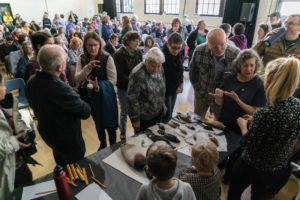Wetland Workshops: An Eventful Year
Over the last 18 months, DNDA has toiled away through several climate events and a global pandemic to bring you nine wonderful wetland workshops with an outstanding cast of 15 diverse and unique presenters! Together we traveled from the past through traditional Indigenous stories, to the future of restoration practices in a changing climate, and made many stops along the way. This workshop series was centered around the Delridge Wetland Project in a variety of ways.
The workshop series started in January 2020 with “A Sense of Place: An Exploration of Space & Time through Traditional Storytelling.” This workshop showcased four Indigenous storytellers that shared traditional stories from around the Pacific Northwest and beyond. The day began with Sondra Segundo 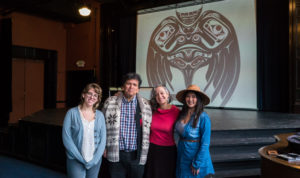
At the end of February 2020, before we knew how precious in-person gatherings were, DNDA hosted over 125 people at Youngstown Cultural Arts Center for an event titled “Fall in Love with 25 Seattle Birds”. Hanae Bettencourt and Anna Murphy from Seattle Audubon Society led a discussion on identifying 25 common birds around the Seattle area such as buffleheads, rufous and Anna’s hummingbirds, and the golden-crowned kinglet. In addition, tips on how to live a more bird-conscious life were given in regards to habitat loss, domestic cat practices and window decals. For a virtual copy of the 25 Seattle Birds pamphlet, email bri@dnda.org.
After a brief lifestyle change, DNDA welcomed back to the virtual scene Pah-tu Pitt of the Warm Springs and Wasco tribes to discuss and speak on Traditional Ecological Knowledge through a lens of Environmental Justice in conjunction with Bri Castilleja of the Samish Indian Nation. In this workshop, participants were asked to consider the connection to the land of their ancestors through plants and place. Participants were also informed on a variety of environmental justice issues faced by tribes and Indigenous people today. To see more of Pah-tu’s art and cultural work, click here.
In November, we explored the “Geology and Paleoecology of the PNW” with Taryn Black, a PhD student studying glaciology in the University of Washington Department of Earth and Space Science. Paleoecology is a branch of ecology that is concerned with ancient environments and their relationships to ancient plants and animals. This interactive virtual workshop took us through many layers of the geology that surrounds us here in the Puget Sound and how this can be seen again through the paleoecology of our environment. It was at this point during our new work from home lifestyle that DNDA discovered the power of recording these virtual workshops, so if you’re interested to find out where the only bedrock in Seattle can be seen, along with many other interesting information and facts, click here!
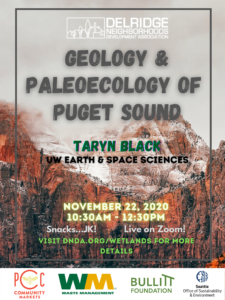
Yakaiyastai Gorman-Etl joined us in the virtual space in March to share her unique perspective on Indigenous Food Sovereignty and the food system currently in place. Yakaiyastai is originally from Arizona and is of Dine and Navajo heritage. She grew up in a traditional Navajo household with a strong influence of ceremony. She is currently working towards her Masters in Public Health and teaching at Northwest Indian College in Lummi territory. Her presentation showed us the importance of food and self-determination to Indigenous people through an intimate look at her life growing up and her academic and professional work. To access this recording, click here.
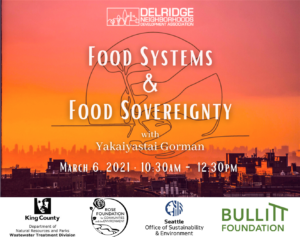
In the penultimate wetland workshop of this series, Shelagh Brown and Rosie Cayou (Samish) were brought together to discuss herbalism from the intersectional lens of African-American and Indigenous perspectives in North America. Shelagh Brown is a community educator and activist that shared a powerful presentation on the appropriation of Western herbalism from African-Americans during the slave trade, and what some of the most culturally significant plants were to the African diaspora at this time. This presentation was followed by Rosie Cayou who gave an ultra-traditional presentation of singing, discussing the Old Ways of the Coast Salish people pre-colonialism and the herbal and plant knowledge she inherited from her parents. This workshop can be watched here.
In June, Sarah Wheatley from the Samish Indian Nation’s Department of Natural Resources joined us to discuss resource management from a variety of perspectives for our final workshop. The purpose of this workshop was to learn about the Indigenous resource management techniques and processes, and to compare and contrast these with the current waste infrastructure we see and live in today. Sarah’s professional work with Coast Salish tribes and her experience in waste infrastructure made this a rich discussion. To watch, click here.
If you can’t decide which wetland workshop to watch first, you can watch a short recap video of ALL the workshops here. This experience was certainly not what was expected when planning this series, but like many other aspects of our lives, we adapted and came together to educate ourselves and our communities. DNDA would like to say an enormous thank you to all of the presenters that shared their time and expertise, all of the attendees for their participation and interest and to our Environmental Education Coordinator Bri Castilleja for coordinating this series. We hope to see you at our next Wetland Workshop event in 2022!
This event series was funded by our sponsors: Bullitt Foundation, King County Department of Natural Resources and Parks Wastewater Treatment Division, Rose Foundation for Communities and the Environment and Puget Soundkeeper Alliance, and City of Seattle Office of Sustainability and Environment. Thank you all!

